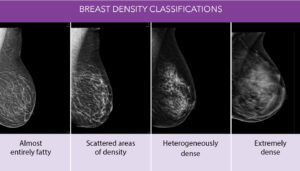Advanced screening for dense breasts.
Breast density – what does it mean?
All breasts are not the same. Some are fatty, some are dense and some are mixed. Breasts are made up of a mixture of fibrous, glandular and fatty tissue. Your breasts are considered dense if you have more tissue than fat. On a mammogram dense tissue looks white. Since masses or lumps also appear white on a mammogram, a suspicious lump may be masked by the dense breast tissue.
Dense breast tissue is also linked with an increase in the risk of developing breast cancer. Women with extremely dense tissue have a greater risk of developing breast cancer than women who do not have dense breast tissue. Automated Breast Ultrasound (ABUS) provides a 3D ultrasound image and provides a way to examine the layers of tissue to identify any abnormalities.
Do you have dense breasts?
Breast density is determined by the radiologist who reads your mammogram and classifies the density into one of four categories. Your provider will tell you if you have dense breasts based on your mammogram’s classification on the density scale. See the below link for a full explanation.

Should I have an ABUS screening?
ABUS breast cancer screening is specifically developed to find cancers hidden in dense breast tissue, which may be missed by mammography.
If you have dense breast tissue, the addition of ABUS screening can increase the detection of cancers. ABUS screening will help provide a clear evaluation of your dense breast tissue.
The ABUS screening experience
From the moment you lie down on the exam table, you’ll realize the ABUS screening is completely unlike a mammogram. A layer of lotion is applied to your breast, and then a scanner is firmly positioned on your breast to acquire the images. The doctor will review the ABUS screening images along with your mammogram. See the below link for a full explanation.
Will my health insurance cover an ABUS screening?
The coverage of ABUS may vary by insurance carrier, as there may be an out-of-pocket expense. Our benefit department will check with your insurance company and provide coverage information. Our staff will obtain any prior authorizations as determined by your insurance plan.
Ask your doctor today if an ABUS screening would benefit you.
